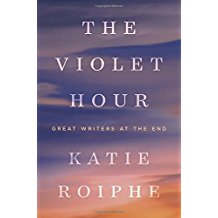The Violet Hour: Great Writers at the End, Katie Roiphe, 2016
Roiphe who experienced a near-death, serious illness as a child is obsessed with death and has chosen to ‘write about deaths. Not the deaths of people I loved but of writers and artists who are especially sensitive or attuned to death, who have worked through the problem of death in their art, in their letters, in their love affairs, in their dreams. I’ve picked people who are madly articulate, who have abundant and extraordinary imaginations or intellectual fierceness, who can put the confrontation with mortality into words in a way most of us can’t or won’t.” So she chose Susan Sontag (willing to try anything or do anything to prolong her life and keep on writing), Sigmund Freud (studied death intellectually refusing pain meds so as to remain conscious and aware of what he was experiencing), Dylan Thomas (drank, whored, and read his poetry right up until his death from alcohol), John Updike (writing poetry into his final hours and surprised to be facing the end), Maurice Sendak (who drew death over and over again), and James Salter who in describing his book Light Years in the Paris Review made this most beautiful observation about marriage: “The book (Light Years) is the worn stones of conjugal life. All that is beautiful, all that is plain, everything that nourishes or causes to wither. It goes on for years, decades, and in the end seems to have passed like things glimpsed from the train—a meadow here, a stand of trees, houses with lit windows in the dusk, darkened towns, station flashing by—everything that is not written down disappears except for certain imperishable moments, people and scenes. The animals die, the house is sold, the children are grown, even the couple itself has vanished, and yet there is this poem.” Wow! Roiphe quotes George Bernard Shaw who said, “Don’t try to live forever, you will not succeed.” She decides that the key is that “there was beauty in these deaths, the life rushing in, the vastness of the work, the great, sometimes deranged seeming courage, the mad love in the last moments.” This is a good book, an important book, one which may serve as well as any as an owner’s manual on ‘how to die’. We’ll all go through that. Might as well be as prepared as one can be.



